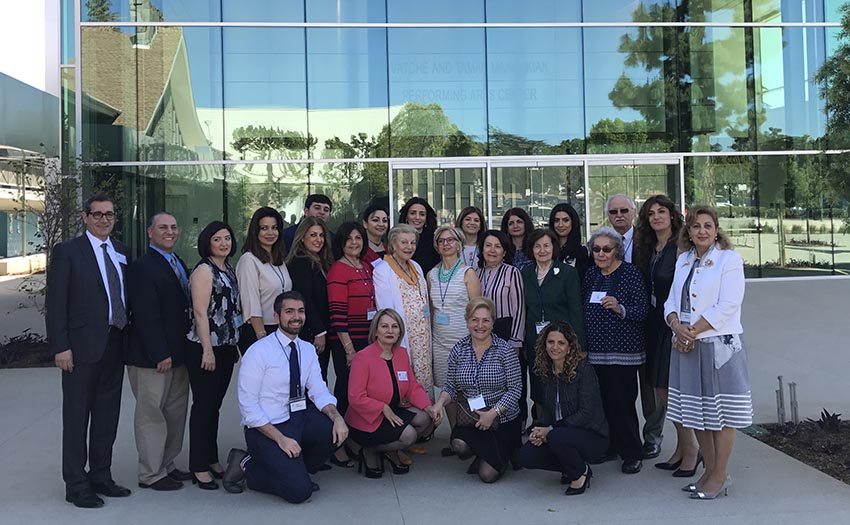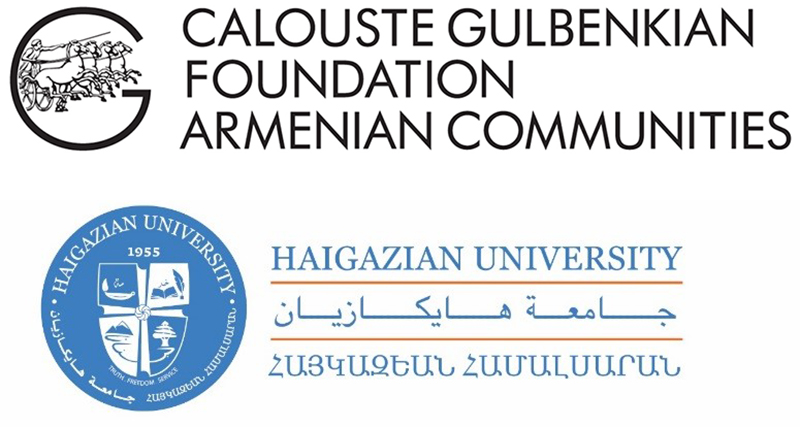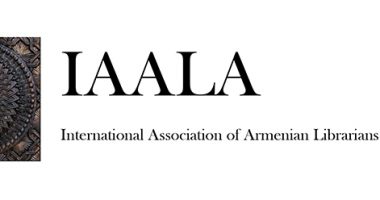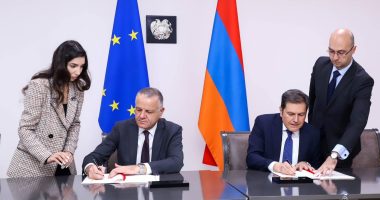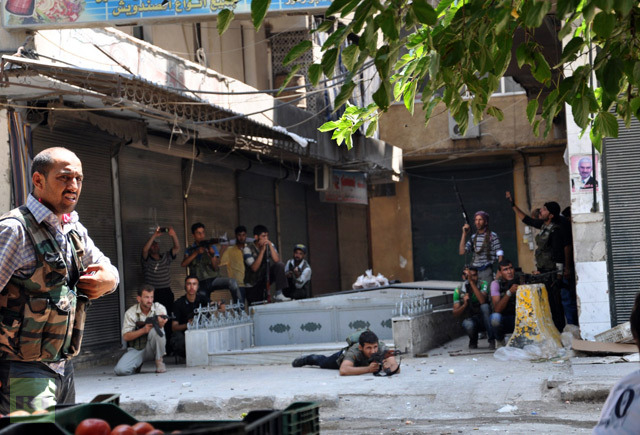By Sona Zeitlian
The focus of AGBU Hye Geen’s and Young Circle’s 2017 Annual International Conference was empowering the Armenian family, the basic institution of our national survival. The event took place on April 1 at the newly renovated AGBU Vatche and Tamar Manoukian Center on 2495 East Mountain Street, Pasadena. The speakers were two distinguished sociologists from Armenia and one from Fresno, California, two inspiring spiritual leaders and a deputy attorney of Los Angeles County. The participation of student volunteers in presenting the speakers and facilitating the Question and Answer session was proof of their engagement in making a difference in the community.
The Conference began with the welcome address delivered by Sona Yacoubian, Founder and Chairperson of AGBU Hye Geen. She cited the waves of Armenian immigrants into the United States beginning with the Genocide survivors, then the influx of immigrants in the 90’s from Armenia and the dispersal of the Armenian communities of the Middle East. The new settlers “brought with them the authentic Armenian character and rejuvenated the whole community in Southern California. They were family oriented, spoke Armenian, celebrated their religious and ethnic culture and most worked hard to realize the dream of a prosperous and joyous life.”
Immigrant youths exposed to prejudice and discrimination “tried to escape their heritage.” At the same time, a growing fascination with social media had a “devastating effect on the morals of children, affecting the hierarchy within the family.” Community organizations were active, supporting the retention of the Armenian identity and the preservation of the national heritage.
The first speaker was Misha Margaryan, a graduate of Yerevan State University’s Methodology of Sociological Research in Master program. He was introduced by Hripsime Biazyan stating that his research was focused on the state of the Armenian family caught in the crosscurrents of modernization, globalization and national identity. His chosen topic was “The Modern Armenian Rural Family: Family Roles and Values.”
The speaker first dwelt on the characteristics of a modern rural family, its core values of unconditional love of children, care and emotional support of elderly parents, the wife’s readiness to mediate in conflicts, her hard work at home and in the fields, as well as resilience in the face of significant obstacles. It would be interesting to explore the economic empowerment of rural women and their role in boosting the nation’s economy, especially during times of distress and economic vulnerability. Moreover, unlike men, it is not acceptable for women to seek job opportunities abroad.
As head of the family, the husband is the breadwinner and decision maker in all financial, household and personal life matters. Even when he is unemployed, his help in household chores is considered unmanly. Finally, he spends his leisure time with friends and neighbors, whereas his wife spends time at home.
The second speaker was Father Vazken Movsesian, director of Youth and Christian Outreach of the Western Diocese of the Armenian Church. He has also founded the “In His Shoes” movement, delivering food and shelter worldwide. His topic was “Spiritual Accountability” and was introduced by A. Manuel.
He began by advocating higher education as a national responsibility and condemning the damaging effects of the materialistic mentality, which can only inspire a false sense of security. The pursuit of higher education entails identifying with the Armenian heritage, striving for the prosperity of our Homeland and deepening the consciousness of the national tragedy, the Genocide
Reflecting on our turbulent history, he asserted that the Armenian Church has functioned as a basic social institution, gaining the trust of the nation by its exemplary spiritual leaders. Our community of faith, has sustained us in our darkest hours, and inspired hope for national regeneration.
The third speaker was Pastor Daniel Albarian, whose topic was “Nurturing the Family for the Advancement of Culture.” He was introduced by Emily Samuelian, who stated that he was the founding pastor of the Armenian Christian Fellowship of Orange Country and from 1998 onward, he had guided the Christian Outreach for the Armenian Church.
He began by deploring the erosion of family values and long term commitments, as well as the prevailing poverty and homelessness. Divorce and abortion rates have risen, 43% of children raised by single mothers, 90% of runaway children with behavioral disorders, 71% school dropouts and 85% in prison.
He then defined a healthy family having a sense of purpose, believing in honesty and dignity, professing a binding faith and sharing group activities. He affirmed that the success of civilization and the endurance of culture depends on the strength of such families.
The fourth speaker was Dr. Anahid Nara Sahakyan, whose topic was “Selective Abortion as a Manifestation of Domestic Violence.” Mariam Khachatrian introduced her as Vice Dean of the Faculty of Sociology at Yerevan State University, who had written extensively about gender based violence and successfully managed the program of AGBU Hye Geen’s Pregnant Women’s Centers in Armenia.
In line with the 2016 Global Gender gap Report, the speaker acknowledged that Armenia rated second in sex selective abortions, undermining the annual birth of 1400 girls. Most of these abortions were performed under pressure from the head of the family. Armenian men’s preference for male children served to reinforce “their prestige and self-appreciation.” It was also based on the concept “of the son as the household keeper, the principle workforce ensuring the family’s well being, the care of elderly parents, the guardianship of the family wealth and honor.”
Selective abortions were so widespread, that the practice was considered “normal.” For lack of resources, many were performed not by doctors or in hospitals, but by means of “home made devices,” to the detriment of women’s health.
Finally, the speaker confirmed that the Armenian government had issued a law to counter sex selective abortions by means of supervision of doctors, the use of media and educational institutions to raise social consciousness and improve the status of women. However, law enforcement impunity continues to be a key human rights problem in Armenia.
After the complimentary midday lunch, it was the turn of Frederick Mesrobi, Esq. Deputy Attorney in Los Angeles County presenting “Domestic Violence Law in California.” He was introduced by Katherine Tabakian, who cited his expertise in prosecuting violent crimes happening within the family, stressing the effects on children exposed to emotional, verbal or sexual assaults. He was also known for mentoring mostly Armenian law students, sharing his experience of sex and hate crimes, as well as the means of preventing them.
The speaker began by referring to domestic violence as one of the most pervasive manifestations of traditional discrimination against women. The perpetrator exercised power to control or bend the victim to his will and maintain his authority in the family. The victim is seldom eager to report the abuse due to shame, or financial dependence on the abuser, or inability to find shelter.
Available records indicate that 15.5 million children are traumatized by domestic violence in the form of battery, torture or assault with a deadly weapon.
To combat the scourge of domestic violence, the speaker recommended raising awareness of women’s rights, improving the standards of public education, consolidating civil society and providing services for victims. At the same time, the prosecution of cases of repeat offenses should be expedited.
The last speaker was Dr. Matthew A. Jendian, founder of the Humanics Program in Community Benefit Administration at Fresno State University and Chair of the Sociology Department. His presentation entitled “Becoming American, Remaining Ethnic Armenian” was based on his own published research about the subject. The introduction was made by Diana Dzheragyan.
Citing the prejudice and discrimination that plagued Armenian immigrants in Fresno until 1940, the speaker claimed that those attitudes eventually fostered ethnic group identity and solidarity. The retention of identity varied from one generation to the next, depending on the values of the family, the structures of the ethnic community offering opportunities for socialization and cultural transmission, as well as affiliation with an Armenian Church forming a spiritual center of gravity.
In a multi ethnic society intermarriage was inevitable and was increasing among Armenian Americans. With the closer integration, the important factors defining ethnic identity are speaking Armenian, knowing Armenian history, forging relations with Armenian organizations and feeling proud of the Armenian heritage. Although culture has evolved, the vision for the future is mostly based upon its knowledge of the past to define feeling Armenian in the modern world.
The presentations were followed by a well-coordinated Question and Answer session conducted by Garen Aliksanian with the participation of student volunteers. The speakers were gratified by the probing questions and continued interest shown by an appreciative audience.
In a remarkable finale, the Conference Committee honored three dedicated AGBU Scout Movement members for fundraising over $1000 in support of Hye Geen’s Pregnant Women Centers in Armenia. The honorees were Aline Babikian, Rachel and Marilyn Bedoyan.
For closing remarks, Talin Yacoubian Esq., Chair of AGBU Western District, summed up the day’s presentations, commending the hard work and organizational skills of AGBU Hye Geen and Young Circle members as well as the cooperation of enthusiastic volunteers.
The 11th International Conference was a significant event for its message of national renewal through raising awareness and revitalizing the modern Armenian family. In the words of Sona Yacoubian, AGBU Founder and Chairperson, it set a memorable example of “Civil Society at work.”

